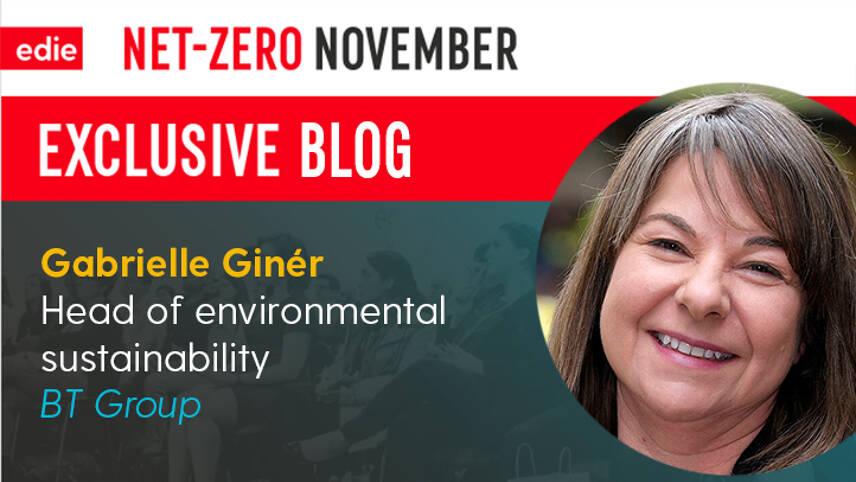Register for free and continue reading
Join our growing army of changemakers and get unlimited access to our premium content

As the head of environmental sustainability at BT Group for the last 13 years, I’ve been lucky enough to represent the company on the world stage.
My first UN climate summit was in Paris in 2015, and on my return, I realised the importance of now setting science-based targets aligned to limit global temperature increases to below 1.5 degrees.
Fast forward seven years to COP27, and I’m reminded of two things; firstly, the need to talk about climate change, and secondly about the need to act.
In my mind, the role of business has always been about innovation and collaboration; with a core belief to turn pledges and ambitions into actions and implementation.
In 2017, BT Group was one of the first companies in the world to set a 1.5-degree target, validated by Science Based Targets initiative. And in 2021, we announced new targets; to reach net zero by the end of March 2031 for our own operations and by the end of March 2041 for our supply chain and customer emissions.
To get there, we’re already using 100% renewable electricity worldwide, we’re transforming our workplaces with a move to fewer, more sustainable, and efficient buildings and we’re switching the majority of our 33,000 commercial fleet to electric or zero carbon vehicles by 2030.
Working collaboratively
Collective climate action has helped us make progress faster and inspire others. That’s why in 2020, we joined forces with Openreach and the Climate Group to launch the UK Electric Fleets Coalition. 30 fleet operators are now part of the coalition, and we’re all advocating for the faster adoption of electric vehicles in the UK and for the kind of supportive policies that will help speed up the transition, such as availability of supply, grants and nationwide charging infrastructure.
Like many companies in the telecoms sector, only a small percentage (6%) of our end-to-end carbon emissions come from our own operations. 70% comes from our supply chain and 23% from customers using our products and services. So we’re working with the UK Government, trade associations, NGOs, policy makers and other organisations such as techUK, 1.5°C Supply Chain Leaders and the SME Climate Hub to help drive progress on Scope 3 emissions.
As a business, we’re using our purchasing power and innovation to drive action across our supply chain and to encourage transparency by getting suppliers to disclose to CDP – a not-for-profit charity that manages the global disclosure system.
The role of technology in the race to net zero
Our fixed full fibre and 5G mobile networks can help our customers, businesses, public organisations and consumers cut carbon too. Technology has the potential to make cities and factories smarter and would allow homes to be run more more efficiently.
A report commissioned by BT Group and developed by Accenture found that the tech sector is could reduce its energy demand and global carbon emissions by as much as 40% over the next decade – despite an expected eight-fold increase in data traffic by 2030. This was one of the reasons we set a new target to help customers avoid 60 million tonnes of CO2-equivalent (CO2e) by the end of March 2030.
The importance of net zero
We know that targets drive innovation and performance. The COP26 climate summit in Glasgow brought into clear focus the need for governments and businesses to step up and help deliver emissions reductions faster. All pulling in the same direction towards a common goal.
Being able to measure and monitor progress is key to understanding and driving change. Companies need to be transparent about their targets, understand how they are going to achieve them and share what progress they are making and the challenges they face along the way. If we don’t share our challenges, we can’t collaborate to overcome them.
One thing we encourage is that small businesses join the SME Climate Hub, which gives them recognition by the United Nations Race to Zero campaign in their efforts to mitigate emissions. The SME Climate Hub provides companies with the tools to help better understand the origins of their emissions, and how to tackle them in a manageable way.
The need to act now
I’m hopeful that COP27 will inspire many more companies to join us in the race to zero. We’re calling on all businesses to outline their plans to reach net zero, share their challenges and to engage with policymakers, civil society, customers, supply chains and colleagues.
Our work as part of the 1.5 supply chain leaders shows what can be achieved when like-minded organisations such as Ikea, Ericsson, Telia Company and Unilever come together. It provides businesses like ours with a platform to encourage others to get involved and to drive collective action.
Together we have the opportunity to work together to create a fairer, more resilient, low carbon society, but time is running out.
COP27 provides a forum where we can foster cross-sector coalitions to share best practice, it also gives businesses like BT Group the opportunity to spark conversations with key policy makers to demonstrate how we move pledges and ambitions into actions and implementation.



Please login or Register to leave a comment.